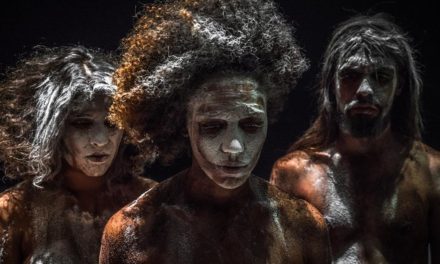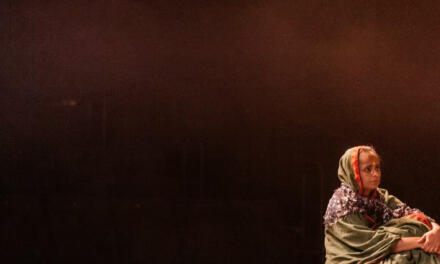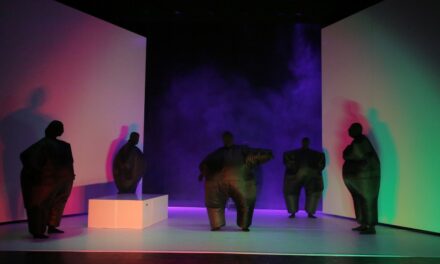What unites Sid Vicious and Ricky Nelson, Elvis, and Kurt Cobain, is not just that they were singers, but that they all died young. The Sound of Falling Stars, which was performed at the Adelaide Cabaret Festival and was written and directed by the inimitable Robyn Archer, conjured up 31 such souls. They are among the most popular and beloved voices of the 20th century, and responsible for songs that have served as soundtracks for the lives of so many.
But this is no jukebox musical in the mode of, say, Jersey Boys. There will be no lighthearted romp through the back catalog of our glorious dead, but rather, ultimately, a reckoning of our relationship with them.
With the brilliant, versatile, charismatic singer/actor/musician Cameron Goodall as the conjurer-in-chief, backed up the superb musicianship of George Butrumlis (accordion) and Enio Pozzebon (keyboard), this is a thrilling, at times in-your-face evening of music theatre.
The performance is kicked off by the ultimate bad boy of rock, Sid Vicious of the Sex Pistols, who famously checked out at age 21. Goodall, who has the miraculous ability to switch on and off the vocal and physical characterizations of these 31 male singers, struts across the stage as Sid. He spits scorn, informing us that this show will not be about “old bastards” like David Bowie, who lived to the ripe old age of 70.
Then, with no fanfare, Goodall is suddenly transformed into Elvis. In spite of the actor’s naturally svelte appearance and tied-back long hair, we immediately see and hear only “the King”. Capturing his liquid movements and unique elocutionary style, Goodall croons his hit song, “Are You Lonesome Tonight?” Next up is Hank Williams (dead at 29), the brilliant singer-songwriter more squarely placed within the country category, who gave us “Your Cheating Heart,” also popularized by Elvis.
We are given only snippets of songs, typically a complete stanza, just enough to tell us a story, or part of a larger story. No song is fully completed. By the time Mario Lanza (dead at 38) appears, with Goodall belting out just a few lines from “O Solo Mio,” giving us vibrato for days, it is clear that there will be no jukebox pleasure. This is a work that forces us to listen to the words of these men as we have never stopped to hear them before, while the larger musical weft and weave of the evening is driven by seeming details of their lives and deaths that inform their work.
A raft of these icons met their maker in plane crashes, among them teen icon Ricky Nelson, Otis Redding and the famed trio of Buddy Holly, Ritchie Vallens and J.P. Richardson (aka “The Big Bopper”) who perished in Iowa in a small plane on a cold February night in 1959.
Others suffered from depression, among them rock god Jim Morrison, shy, night-loving Brit Nick Drake and alt-indie genius Elliott Smith. As we move through this territory, it strikes me that this trio, along with the ethereal and musically omnivorous Jeff Buckley who drowned at 30, occupies much space in my CD collection. This is possible when, for many, the lens turns back on us, the spectator.
Sid returns one last time to give us a reality check, reminding us that singers such as these men, our icons, “take risks”, that they aren’t going to be buying property in our suburban subdivision. Then, and entirely appropriately, Kurt Cobain (dead at the magical rock age of 27) is summoned, turning the mirror back on us as he shrieks out his famed lyrics:
I feel stupid and contagious
With the lights out, it’s less dangerousHere we are now, entertain usEntertain us, entertain us, entertain us.
And as we leave the theatre, it is with the knowledge that while our own appetites may have fired up these brilliant souls, we also had a hand in their undoing.
This article originally appeared on The Conversation on June 25th 2017. It has been reposted with permission.
This post was written by the author in their personal capacity.The opinions expressed in this article are the author’s own and do not reflect the view of The Theatre Times, their staff or collaborators.
This post was written by William Peterson.
The views expressed here belong to the author and do not necessarily reflect our views and opinions.


















